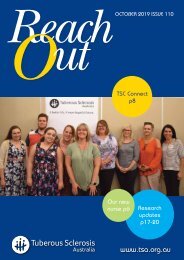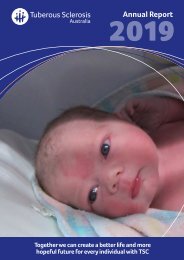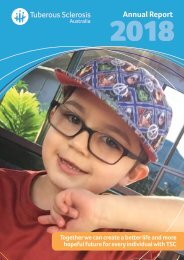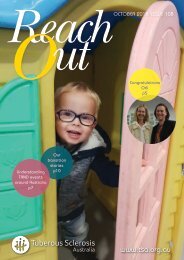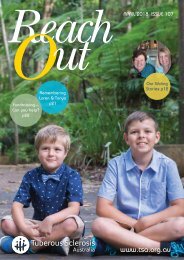Reach Out April 2019
Create successful ePaper yourself
Turn your PDF publications into a flip-book with our unique Google optimized e-Paper software.
Personal Information Stories<br />
For young children, there are a group of interventions called<br />
naturalistic behavioural interventions. These involve shared<br />
control between the therapist and parent. They often take place<br />
within the home environment and are generally more flexible than<br />
other more structured approaches.<br />
TAND at school<br />
Choosing the right school and securing the required supports is a<br />
challenge many families with a child with TSC face. Many families<br />
choose a mainstream school for their child who may have specific<br />
learning difficulties or delays, but report significant struggles to<br />
secure and keep additional classroom supports.<br />
When choosing a school, one TSC family reported that they<br />
chose the school based on the ‘feeling’ of the school community<br />
and how collaborative they were with parents. A school that<br />
has access to allied health professionals, such as occupational<br />
therapists, to work in the classroom can also be a big benefit for<br />
some children with TSC. It can also be helpful to advocate for your<br />
child to be taught by more experienced teachers and to build a<br />
trusting relationship with these teachers.<br />
In the classroom, a student with TSC may struggle because<br />
of their uneven TAND profile. Teachers may believe a student is<br />
being lazy because they are able to do complex work in one subject<br />
but not in another. We know from formal research into TAND<br />
One of the hardest parts of<br />
TAND is finding the professionals who<br />
can provide the required assessments<br />
and interventions.<br />
that people with TSC can have very specific difficulties, such as<br />
with mathematics, written expression or working memory. This is<br />
one reason that a detailed assessment, that builds a profile of both<br />
strengths and weaknesses, can be so valuable.<br />
Some adults with TSC report that they benefited from<br />
additional help to develop skills that did not come as easily to them<br />
as their peers. Even into adulthood, it is not too late to work on an<br />
area of weakness.<br />
School counsellors are often the gateway to cognitive and<br />
academic assessment. However, many school counsellors and<br />
teachers have limited understanding of TSC and TAND so may not<br />
refer appropriately.<br />
The Tuberous Sclerosis Alliance (USA) has a package of<br />
information for teachers that can help to explain TSC. TSA has<br />
identified a detailed resource for Australian educators as a project<br />
we would like to develop and this project will be one of our<br />
fundraising goals for <strong>2019</strong>.<br />
Lifelong mental health support<br />
The challenges of TAND start right from the moment of diagnosis<br />
and this life-changing event can be traumatic. TSA is working<br />
with the nib foundation, TSC families and health professionals to<br />
reduce this trauma and encourage parents and people with TSC to<br />
seek mental health support through our, soon-to-be-developed,<br />
‘Parachute Pack’.<br />
Your GP is the best place to start and can work with you<br />
to develop and monitor a mental health care plan. Significant<br />
research supports the use of talk therapies with a skilled<br />
psychologist. Talk therapy is also possible for a person with<br />
intellectual disability or communication challenges, but will<br />
require a professional with specific skills.<br />
For children, there are public health services, including mental<br />
health supports, that your GP or paediatrician can refer you to. For<br />
example, in NSW, we have the Child and Adolescent Mental Health<br />
Service (CAMHS).<br />
Medication can be useful for severe anxiety and depression,<br />
specifically the class of medications called selective serotonin<br />
reuptake inhibitors.<br />
Finding and funding for the right professionals<br />
One of the hardest parts of TAND is finding the professionals<br />
who can provide the required assessments and interventions.<br />
Neuropsychologists and neuropsychiatrists can be particularly<br />
useful for assessments and appropriate interventions for<br />
individuals with complex medical conditions.<br />
Talking to other people who experience similar difficulties,<br />
such as others with TSC, can help to identify the most appropriate<br />
professionals to help. In the future, expanding the TSC<br />
Professionals Network, maintained by TSA, could be a way to<br />
identify these professionals.<br />
One TSC family found that they needed to use private services<br />
when the public early intervention options proved to be unsuitable.<br />
“When our son was first diagnosed with TSC, we were<br />
referred to our local area health service for therapy. While physical<br />
therapy was great, we got a different student speech therapist each<br />
appointment and they just weren’t responsive to our son’s needs.<br />
We have had to pay for private therapy, some of which was funded<br />
by Medicare and our private health fund. Since then we have used<br />
a package of funds from the federal government and recently<br />
transitioned onto an National Disability Insurance Scheme (NDIS)<br />
package that covers our son’s intensive therapy,” says Jeremy.<br />
The NDIS is commonly used to access supports for TAND,<br />
but this is usually not an easy or straightforward process. Many<br />
TSC families have found talking to others living with TSC and<br />
related conditions can help them navigate the eligibility and<br />
planning processes. The TSC Information Service can help to<br />
connect you with others in the TSC community and with advocacy<br />
organisations in your area.<br />
The future for TAND<br />
The global TSC community has consistently ranked TAND as<br />
collectively the aspect of TSC that impacts their lives the most.<br />
TSC organisations, health professionals and research funding<br />
bodies are responding to this. For example, The King Baudouin<br />
Foundation in Belgium has set aside 600,000 euros for research<br />
into TAND. The largest TSC patient organisation, the Tuberous<br />
Sclerosis Alliance (USA), has commenced a TAND initiative<br />
including patient information, health professional education and<br />
research projects.<br />
The TAND checklist has been rolled out in various clinical<br />
settings since it was first published in 2015. TAND experts are<br />
reviewing the guidelines for TAND screening and responding<br />
to calls for the checklist to be self-administered. They are also<br />
considering development of a practical TAND toolkit to help<br />
people with TSC identify the strategies and interventions that can<br />
help them live with their unique TAND challenges.<br />
21





![TSA Reach Out April 2022 [Final]](https://documents.yumpu.com/000/066/687/587/3d369bd665bdb406a759500f62e2cfad0ccb7b3d/47512b4a703265727550565249426664566a727454513d3d/396a524e7354316d3867454b587243526164724c52673d3d.jpg?AWSAccessKeyId=AKIAICNEWSPSEKTJ5M3Q&Expires=1718204400&Signature=mrqCiuscWdSY05uNh9RmeoxqVOA%3D)
![TSA AR 2021 [WEB] (1)_FINAL](https://documents.yumpu.com/000/065/886/431/1afb21934ac6c444cd384e5fd7403d62e47080ce/426853747566526573646568546777594b4a4a5734513d3d/547274595943503850786275754544495972536c52513d3d.jpg?AWSAccessKeyId=AKIAICNEWSPSEKTJ5M3Q&Expires=1718204400&Signature=I1irgWK%2BgIQLwSkzwDZIAo99cOA%3D)

![TSA Reach Out Apr 2021 [WEB]](https://documents.yumpu.com/000/065/442/909/1e583cb2acba0eaa7f1aae53e14a0cf408aa56c4/7871796d694459464d707163324830746459484671673d3d/45356637637a3369494f764f4c3858495549795251513d3d.jpg?AWSAccessKeyId=AKIAICNEWSPSEKTJ5M3Q&Expires=1718204400&Signature=LhPI4huikI6mqhqEhFMzzqhk4is%3D)




